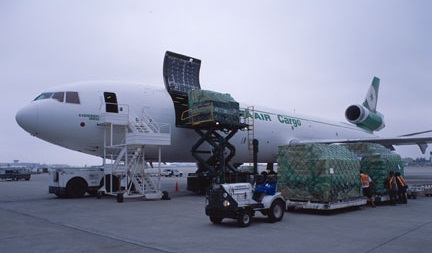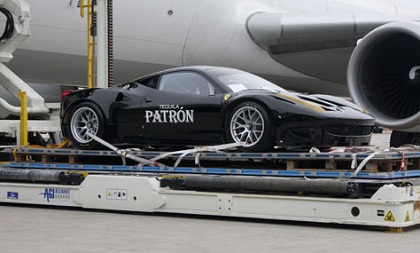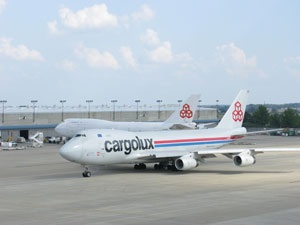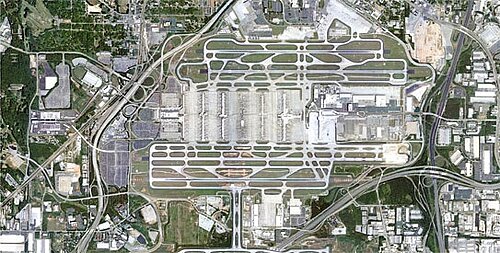Hartsfield-Jackson: Gateway to Global Commerce
Hartsfield-Jackson Atlanta International Airport is the world’s busiest airport, serving more than 92 million passengers annually with nonstop service to 160 U.S. destinations and nearly 70 international destinations in more than 45 countries. Considered to be the largest inland port in the world, Hartsfield-Jackson serves as the global gateway for the southeastern United States.
Atlanta’s vibrant economy and geographic location make it a convenient and strategic home for many Fortune 500 companies. Its extensive network of air, road and rail services, connections to port facilities, global telecommunications and advanced software network make Atlanta a logical location for cargo carriers that want to expand their global networks. Hartsfield-Jackson’s leadership in cargo operations earned it the Airport of the Year award from Air Cargo Week in 2009, 2010 and 2012.
State-of-the-Art Facilities
Hartsfield-Jackson’s airfield consists of five parallel runways separated by a 5.8 million-square-foot Central Passenger Terminal Complex. Hartsfield- Jackson was designed to handle large volumes of flights and passengers and accommodates about 2,600 daily takeoffs and landings. The Airport recently completed a $6 billion-plus capital improvement program that included a fifth runway, a consolidated rental car center and the new Maynard H. Jackson Jr. International Terminal. With the May 2012 opening of the international terminal, Hartsfield-Jackson is one of the few airports in the world able to accommodate more than 100 million passengers annually.
Cargo Complexes
The cargo facility at Hartsfield-Jackson comprises almost 1.5 million square feet (135,000 square meters) of cargo handling space at the north, midfield and south cargo complexes. They all have their own stands and refueling and support systems, and all have excellent dockside access to interstates 75, 85 and 285, allowing Airport cargo operators quick turnarounds.
Adjoining the Airport is the 260-acre (104-hectare) Atlanta Tradeport, which serves the air cargo community by providing facilities for shippers, forwarders and brokers. The complex, which includes an international trading center, has multipurpose foreign trade zone status, allowing users to delay, reduce and sometimes eliminate import duties on materials and finished products. In addition, Atlanta was the first U.S. Customs model inland port, in which most international cargo can be cleared electronically within a fourhour window.
Perishables Complex

In addition to traditional cargohandling facilities, Hartsfield-Jackson has an on-site perishables complex. The 42,000-square-foot (3,789-squaremeter) perishables complex provides accommodations for perishable goods, such as flowers, pharmaceuticals, seafood, fruits and vegetables. The perishables complex is the only facility in the southeastern United States that is approved by the U.S. Department of Agriculture (USDA) to offer on-site cold treatment and fumigation treatment of fruit fly host plants. A fully equipped on-site laboratory staffed with trained USDA entomologists facilitates fast, efficient inspection of shipments; the process often takes only four hours from planeside to roadway.
Hartsfield-Jackson also is one of only 16 U.S. airports to be designated a U.S. Fish and Wildlife port of entry, allowing the facility to receive fish and wildlife shipments.
Broaden your international connections through Hartsfield-Jackson
Hartsfield-Jackson, a major cargo hub for SkyTeam Cargo, is becoming a major world port for air cargo. The Airport is the 10th-busiest U.S. airport for total air freight tonnage, and nine of the top 10 cargo airlines in the world operate at Hartsfield-Jackson.
Atlanta: Transportation hub of the Southeast Hartsfield-Jackson expedites global trade
Hartsfield-Jackson is rare among the nation’s airports, because it was designed to serve an entire region, rather than only a city. As the Southeast’s center for transportation, Atlanta has four major interstate highways and two railways that intersect to create an extraordinary concentration of rail systems, trucking companies, warehouses and distribution centers.
Hartsfield-Jackson’s strategic location makes it the most effective gateway to reach most of the country. Whether by truck, train or air, more than 80 percent of the U.S. population and 79 percent of the nation’s 150 largest metro areas are within two delivery days from Hartsfield-Jackson.
In addition, metro Atlanta’s exceptional distribution infrastructure offers Atlanta-based businesses advantages in today’s global economy. Boasting the nation’s seventh-largest industrial market in square footage, the area offers a wealth of distribution options.

At Hartsfield-Jackson, Efficiency Means Expedient Service and Low Costs
Designed as a hub-and-spoke facility, Hartsfield-Jackson can accommodate large volumes of flights, which makes connections as efficient and expedient as possible for both cargo and passenger carriers. Five parallel runways straddling seven concourses facilitate quick access from taxiways to gates. The design makes it possible for more than 2,600 flights to land and depart daily. By 2015, that number is expected to increase to 3,400 daily operations. Hartsfield-Jackson’s efficiency has earned worldwide recognition, including from the Air Transport Research Society, which has awarded its highest honor for efficiency among the world’s top 90 airports to Hartsfield-Jackson in each of the last 10 years.
Hartsfield-Jackson has the lowest landing fees — a signatory fee of 82 cents per 1,000 pounds of maximum landing weight — of all major U.S. airports. Other international airports’ fees are five to 14 times higher. Another advantage at Hartsfield- Jackson is that it is a 24-hour airport; it has neither landing slots nor curfews. For the Airport’s cargo partners, that means shorter transport times and fewer delays.

Hartsfield-Jackson Gives You Access to the World
Since the city began, Atlanta’s growth and success have been linked to its thriving global transportation center. As a convenient connection to both domestic and international markets, Hartsfield-Jackson has helped establish Atlanta as a major business hub that has bolstered the economy and created jobs. With low operating costs, extensive interline connections, expansive international cargo services and a centralized location in the United States’ fastest-growing economic region, Hartsfield-Jackson offers its cargo partners a convenient, profitable location at which to expand their global services.
The following 14 All-Cargo Carriers Operate at Harstfield-Jackson:
- Air France Cargo
- Asiana Airlines
- British Airways
- Cargolux Airlines
- Cathay Pacific Airways
- China Cargo Airlines
- DHL Worldwide Express
- EVA Airways
- FedEx
- Korean Air Cargo
- Lufthansa Cargo
- Qatar Airways
- Singapore Airlines Cargo
- United Parcel Service
The 12 States in Hartsfield-Jackson's Cargo Catchment Area:
- Alabama
- Arkansas
- Florida
- Georgia
- Kentucky
- Louisiana
- Mississippi
- North Carolina
- South Carolina
- Tennessee
- Virginia
- West Virginia


